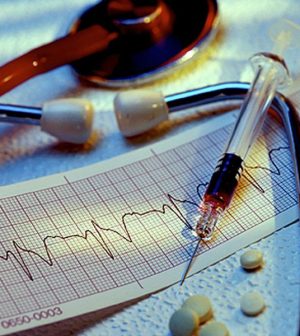- 8 Ways to Increase Dopamine Naturally
- 7 Best Breads for Maintaining Stable Blood Sugar
- Gelatin vs. Collagen: Which is Best for Skin, Nails, and Joints?
- The Long-Term Effects of Daily Turmeric Supplements on Liver Health
- Could Your Grocery Store Meat Be Causing Recurring UTIs?
- Are You Making This Expensive Thermostat Error This Winter?
- Recognizing the Signs of Hypothyroidism
- 10 Strategies to Overcome Insomnia
- Could Artificial Sweeteners Be Aging the Brain Faster?
- Techniques for Soothing Your Nervous System
People Living With HIV Face Higher Odds for Heart Failure

People with HIV have an added risk of heart failure, so they and their health care providers need to be alert for early signs such as shortness of breath, fatigue, leg swelling, coughing and chest pain, according to a new study.
“Cardiovascular disease has been an important concern for people with HIV for many, many years,” senior author Michael Silverberg said in a Kaiser Permanente news release. He’s a research scientist and HIV epidemiologist at Kaiser’s Division of Research in Oakland, Calif.
While most of the research has focused on the risk of stroke and heart attacks, this study shows that the heart impacts for people with HIV extend to end-stage conditions such as heart failure, Silverberg said.
The study included nearly 39,000 Kaiser patients with HIV and about 10 times that number without HIV. Those with HIV were 68% more likely to develop heart failure, and the highest risk was among people 40 or younger, women and Asian/Pacific Islanders, researchers found.
“In terms of young people, it’s possible that they had fewer other complicating health issues, which made heart failure stand out,” said first author Dr. Alan Go, a senior research scientist at Kaiser.
He noted that early data suggest HIV may have a greater impact on heart function in women than in men, due in part to hormones and an abnormal thickening and scarring of heart tissue known as cardiac fibrosis. But, Go added, more study is needed.
“And, overall, not a lot is known about cardiac issues and HIV among Asians and Pacific Islanders,” he said in the release.
The study accounted for heart disease risk factors and medications to prevent heart problems, researchers said.
“Our study showed that the higher risk wasn’t due to differences in access to care,” Go said. “They were all getting the highest-quality care.”
The study also found that the added risk among people with HIV wasn’t because they had more heart disease risk factors or had more heart attacks. In fact, people with HIV had fewer heart disease risk factors than those without HIV, the study found.
The authors said their findings show the need to monitor people with HIV for early signs of heart disease.
“HIV patients often receive all of their care in busy HIV primary care clinics, and it is possible that signs and symptoms of heart failure may be missed, resulting in delays in treatment,” Silverberg said.
He added that there’s a need to learn more so doctors can intervene earlier.
The findings were published Dec. 13 in the journal Mayo Clinic Proceedings.
More information
The U.S. National Heart, Lung, and Blood Institute has more on heart failure.
SOURCE: Kaiser Permanente, news release, Dec. 13, 2021
Source: HealthDay
Copyright © 2026 HealthDay. All rights reserved.










